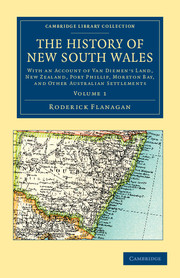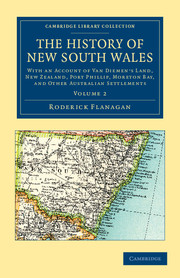Refine search
Actions for selected content:
31 results

The History of New South Wales
- With an Account of Van Diemen's Land [Tasmania], New Zealand, Port Phillip [Victoria], Moreton Bay, and Other Australian Settlements
-
- Published online:
- 05 April 2012
- Print publication:
- 08 November 2011
- First published in:
- 1862

The History of New South Wales
- With an Account of Van Diemen's Land [Tasmania], New Zealand, Port Phillip [Victoria], Moreton Bay, and Other Australian Settlements
-
- Published online:
- 05 April 2012
- Print publication:
- 08 November 2011
- First published in:
- 1862
INDEX TO VOL. I
-
- Book:
- The History of New South Wales
- Published online:
- 05 April 2012
- Print publication:
- 08 November 2011, pp 535-544
- First published in:
- 1862
-
- Chapter
- Export citation
C - Correspondence relative to the Alpacas
-
- Book:
- The History of New South Wales
- Published online:
- 05 April 2012
- Print publication:
- 08 November 2011, pp 502-508
- First published in:
- 1862
-
- Chapter
- Export citation
E - Rates of wages, prices current, and receipt of Gold at Sydney
-
- Book:
- The History of New South Wales
- Published online:
- 05 April 2012
- Print publication:
- 08 November 2011, pp 513-516
- First published in:
- 1862
-
- Chapter
- Export citation
CHAPTER III
-
- Book:
- The History of New South Wales
- Published online:
- 05 April 2012
- Print publication:
- 08 November 2011, pp 113-173
- First published in:
- 1862
-
- Chapter
- Export citation
A - Paper on the Rivers of Australia
-
- Book:
- The History of New South Wales
- Published online:
- 05 April 2012
- Print publication:
- 08 November 2011, pp 477-486
- First published in:
- 1862
-
- Chapter
- Export citation
CHAPTER VII
-
- Book:
- The History of New South Wales
- Published online:
- 05 April 2012
- Print publication:
- 08 November 2011, pp 422-487
- First published in:
- 1862
-
- Chapter
- Export citation
CHAPTER V
-
- Book:
- The History of New South Wales
- Published online:
- 05 April 2012
- Print publication:
- 08 November 2011, pp 247-334
- First published in:
- 1862
-
- Chapter
- Export citation
CHAPTER I
-
- Book:
- The History of New South Wales
- Published online:
- 05 April 2012
- Print publication:
- 08 November 2011, pp 1-90
- First published in:
- 1862
-
- Chapter
- Export citation
CHAPTER VIII
-
- Book:
- The History of New South Wales
- Published online:
- 05 April 2012
- Print publication:
- 08 November 2011, pp 488-534
- First published in:
- 1862
-
- Chapter
- Export citation
CHAPTER V
-
- Book:
- The History of New South Wales
- Published online:
- 05 April 2012
- Print publication:
- 08 November 2011, pp 274-338
- First published in:
- 1862
-
- Chapter
- Export citation
CHAPTER VI
-
- Book:
- The History of New South Wales
- Published online:
- 05 April 2012
- Print publication:
- 08 November 2011, pp 339-421
- First published in:
- 1862
-
- Chapter
- Export citation
CHAPTER II
-
- Book:
- The History of New South Wales
- Published online:
- 05 April 2012
- Print publication:
- 08 November 2011, pp 59-112
- First published in:
- 1862
-
- Chapter
- Export citation
PREFACE
-
- Book:
- The History of New South Wales
- Published online:
- 05 April 2012
- Print publication:
- 08 November 2011, pp v-viii
- First published in:
- 1862
-
- Chapter
- Export citation
Contents
-
- Book:
- The History of New South Wales
- Published online:
- 05 April 2012
- Print publication:
- 08 November 2011, pp ix-xvi
- First published in:
- 1862
-
- Chapter
- Export citation
INDEX TO VOL. II
-
- Book:
- The History of New South Wales
- Published online:
- 05 April 2012
- Print publication:
- 08 November 2011, pp 569-576
- First published in:
- 1862
-
- Chapter
- Export citation
CHAPTER VI
-
- Book:
- The History of New South Wales
- Published online:
- 05 April 2012
- Print publication:
- 08 November 2011, pp 335-419
- First published in:
- 1862
-
- Chapter
- Export citation
CHAPTER I
-
- Book:
- The History of New South Wales
- Published online:
- 05 April 2012
- Print publication:
- 08 November 2011, pp 1-58
- First published in:
- 1862
-
- Chapter
- Export citation
G - Statistics of Agriculture, Vineyards, and Live Stock in the colony; the Land Act
-
- Book:
- The History of New South Wales
- Published online:
- 05 April 2012
- Print publication:
- 08 November 2011, pp 535-568
- First published in:
- 1862
-
- Chapter
- Export citation
